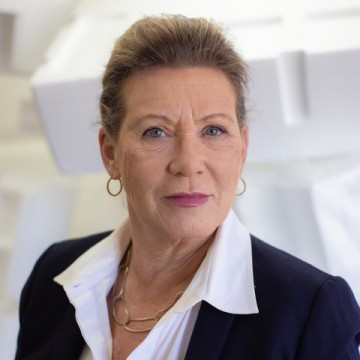Interview With Betsy Bowers, Executive Director of the EPS Industry Alliance

This interview was conducted by Selva Ozelli
Celebrated worldwide on April 22, this year Earth Day has a theme of Plastic vs Planet. Tell us about the Global EPS Sustainability Alliance (GESA).
The Global EPS Sustainability Alliance (GESA) is a collaboration between EPS manufacturers, extended producer responsibility PROs, recyclers, and others to advance the circular economy for expanded polystyrene (EPS) packaging in five continents, and works to support environmental policy solutions at local, regional, and global levels. This collaborative effort brings together best practices in EPS resource management, sustainable manufacturing, life cycle impact reporting and worldwide recycling data to establish universal resources within the EPS supply chain.
GESA represents the expanded polystyrene (EPS) industry internationally. Tell us about the various EPS organizations from around the world that GESA represents.
The GESA coalition represents the EPS industry in Africa, North America, Europe, Asia, and Australia. Our member organizations include:
-The EPS Industry Alliance (EPS-IA) is a trade association representing the EPS supply chain in North America, promoting sustainable EPS practices and advancing innovation in manufacturing, circularity, and recycling.
-European Manufacturers of Expanded Polystyrene (EUMEPS) unites more than 1,000 companies in the EPS industry across Europe, most of them small- and medium-sized enterprises (SMEs).
-EPSbranchen-en del af Plastindustrien represents the EPS-producing companies and the rest of the EPS value chain in Denmark.
-The African Polystyrene Industry Alliance (APIA) is a not-for-profit organization representing some of Africa’s largest producers in the EPS industry and beyond.
-EPS Australia (EPSA) is the national industry body for all manufacturers and distributors of expanded polystyrene (EPS) products in Australia, highlighting the valuable contribution that EPS can make to environmental sustainability.
- Asian Manufacturers of Expanded Polystyrene (AMEPS) was formed in 1994 and has now expanded to include 14 members across the Asia Pacific region. One of the major areas of work that AMEPS has been actively involved in is the establishment and promotion of EPS recycling associations within each member country with the goal of increasing the recycling of EPS across Asia.
Tell us about the significance of the plastics treaty and how it can impact consumers around the world.
The treaty presents a crucial opportunity to tackle plastic pollution from a fresh perspective and adopt innovative problem-solving methods. However, while setting ambitious goals is vital, it's essential to acknowledge and address implementation challenges to ensure that those methods work. We are hopeful that the treaty will introduce novel solutions and align policies that have proven effective.
The plastics pollution treaty could have a dramatic impact on everything from materials for every day uses, the economy from plant closures and potentials bans on commodities, to shipping of goods.
Members of the Global EPS Sustainability Alliance (GESA) attended the United Nations Environment Programme (UNEP) Intergovernmental Negotiating Committee on Plastics Pollution’s fourth session (INC-4), taking place on April 23-29 in Ottawa, Canada. The members are accredited observers, holding consultative roles in the negotiations. What is GESA’s role in INC-4 as accredited observers and experts on the treaty process?
Members of GESA gained accreditation to actively monitor and participate in the treaty development proceedings. It is very important that the EPS industry have representation in Ottawa to inform negotiators from UN member states.
GESA's role in Ottawa is to provide negotiators with information and perspectives and to raise awareness about efficient waste management strategies. We cover all environmental aspects of EPS, such as energy consumption in manufacturing, greenhouse gas emissions, recycling technologies, and packaging science research.
We have come to Ottawa to participate in the crafting of policy and to be part of the solution to a profoundly significant problem. We want to ensure that the treaty does not entail a one-size-fits-all policy, which would be environmentally and economically detrimental in enormous ways.
GESA is encouraged by the chance to contribute substantial feedback alongside other stakeholders and to thereby foster a diverse range of opinions.
EPS maintains an essential role in key industries, including packaging, construction, transportation, manufacturing, automotive, and food service, among others. How would the treaty impact many of these day-to-day products?
The treaty is currently deliberating on policies to define problematic plastics. It is critically important to establish detailed and robust criteria as a foundational step. The production, usage, disposal, chemical composition, and functionality of plastic all must be weighed against potential replacement alternatives.
Moreover, potential restrictions on problematic plastics requires meticulous evaluation. For instance, in 2021, Australia enacted legislation to limit certain plastic packaging materials. However, it swiftly rescinded its decision to include EPS, which is vital for the transport of white goods, fresh fish, and various other products.
The definition of problematic plastics must have clear criteria that recognize nuance and complexity, and make sure that the good isn’t lumped in with the bad.
Why does eliminating plastic pollution need a scientific approach based on data to avoid unintended outcomes?
Unfortunately, there has been a noticeable absence of independent scientific scrutiny regarding the policy options under consideration for the treaty.
It is crucial to verify the environmental trade-offs inherent in the material substitution scenarios outlined in the treaty's Zero Draft options.
The EPS industry proposes that the treaty adopt and enforce the use of Packaging Product Category Rules, which would facilitate the development of Environmental Product Declarations. This approach would broaden material comparisons to encompass factors such as energy consumption, ozone depletion, acidification, eutrophication, ecotoxicity, and human health impacts. These rules are consensus-based protocols established under ISO 14025, mandating third-party review and certification. Such an approach would ensure that paper and other non-plastic alternatives are also appropriately evaluated.
There is also a need for standardized data collection. Even if material substitutions are validated, the performance of a packaging system must be monitored to detect any increase in damage rates. Such occurrences could lead to higher environmental and economic impacts due to the remanufacturing and reshipping of replacements that would be required for each incident.
Furthermore, the effectiveness of policies must be assessed to enable corrective action if implementation proves ineffective in practice. Without a scientific evaluation and comparison method grounded in quantifiable data points, there is significant room for error and the potential for detrimental environmental outcomes.
The Global EPS Sustainability Alliance Supports a Global Plastics Agreement that Creates a Circular Economy for All Plastics and Eliminates Plastic Pollution. What are GESA's environmental policy recommendations?
GESA advocates for the following positions as part of its environmental policy recommendations:
- We support an ambitious plan to eliminate plastic pollution through an implementable agreement.
- We support the creation of a scientific advisory board to determine the best course of action to address potentially problematic plastics.
- We support chemical transparency for materials. Data from reports on EPS’ chemical composition and emissions demonstrate that EPS is a safe material.
- We support the creation of independent national plans of action.
- We support the adoption of science-based tools including life cycle analysis (LCA).
GESA’s recommended environmental policy, observer submissions and position papers can be read in full here.
Tell us about the high recycling efficacy for EPS transport packaging.
Since the early 1990s, international endeavors to engage original equipment manufacturers (OEMs) in EPS recycling have fostered sustained expansion in the commercial sector. The resulting economies of scale have enabled the incorporation of residential waste streams. As a result, there are now stable end-use markets for collected material, and there is growing momentum in the implementation of community recycling initiatives for EPS.
This trend is observable in countries such as the U.S., Australia, India, and others, where collaborations with civil society are underway to integrate EPS into their waste management strategies.
We have seen an EPS packaging recycling rates of more than 30% in North America, an average of 40% in European countries, and above 50% in Japan, China, and South Korea.
Tell us about the resin providers' proprietary formulas to help fabricators incorporate at least 30% recycled content in the manufacture of many applications.
Key resin producers like RAPAC, Epsilyte, Styropek, Nexkemia, and BASF have developed exclusive formulations enabling EPS manufacturers to integrate ≥30% recycled content into various applications' manufacturing processes.
Recycled content resin offers performance properties on par with virgin materials, which curbs the demand for virgin resources and lessens environmental impact. The recycled content will find application in various products, including protective packaging, bicycle helmets, construction materials, drainage and septic systems, among others.
While technically feasible for some time, the use of recycled content EPS has historically lacked motivation from end users. However, we are seeing a shift in this trend. With national governments proposing more stringent policy measures, there is increasing pressure on the private sector to reconsider recycled content capabilities.
Anything else you would like to add?
There is a common goal amongst stakeholders in the treaty to end plastic pollution. While the relationship between industry and environmental advocates often gets painted as contentious, it is vital that there is collaboration amongst all involved in order to make true progress towards a more sustainable world.
What are your recommendations to the ordinary person in reducing plastic pollution in their day-to-day lives?
In their daily lives, regular individuals can take action within their homes and workplaces. Most understand the basics: reduce consumption, recycle, repurpose, and reuse.
However, two significant issues need addressing: the expectation of ease and accountability.
As consumers or workers are often the first link in the disposal chain for any item, their actions are critical. It’s important for people to educate themselves on proper disposal methods to ensure materials are handled correctly.
People must continue to educate themselves because disposal methods evolve. This includes staying informed about company policies, residential recycling guidelines, community collection events, and other relevant information sources. Collective success in combating plastic pollution hinges on behavioral change.
While companies may face fines for non-compliance, consumers typically aren't held accountable in any way. To address this, there has been discussion about implementing policies targeting residential waste streams, such as pay-as-you-throw systems and warning notifications (followed by monetary penalties) for improper disposal.
How can organizations and individuals get involved with GESA?
GESA, as a global organization, possesses the capacity to link waste management professionals, government officials, small business stakeholders, and citizens with EPS recycling solutions and opportunities. The EPS industry disseminates these informational resources through various channels, including social media and other news platforms.
How can people reach you?
People can find me on LinkedIn, and more information on GESA at globaleps.org.
--Betsy Bowers, Spokesperson for GESA, Executive Director of EPS Industry Alliance




